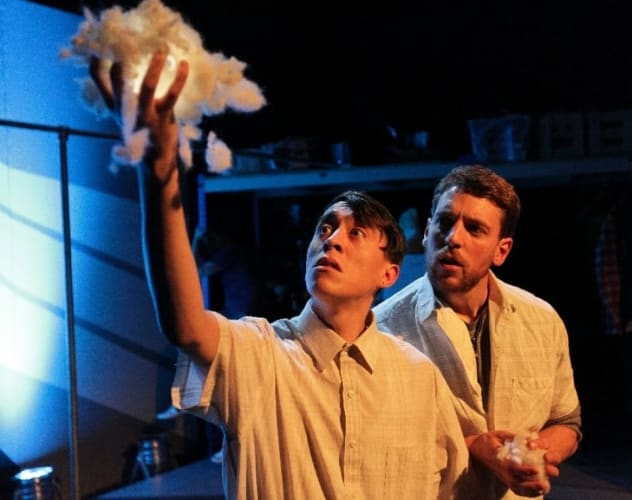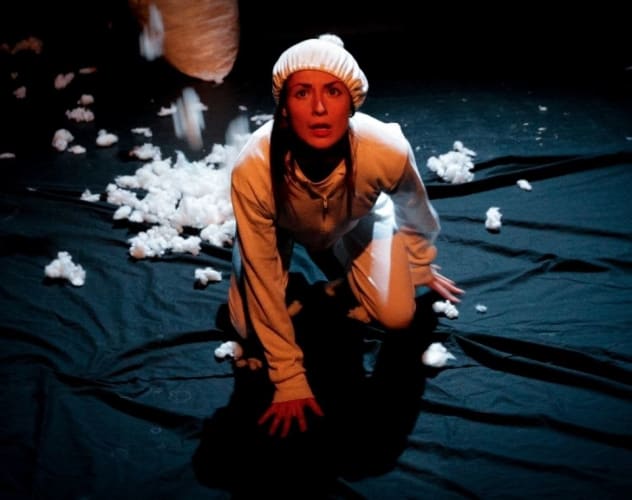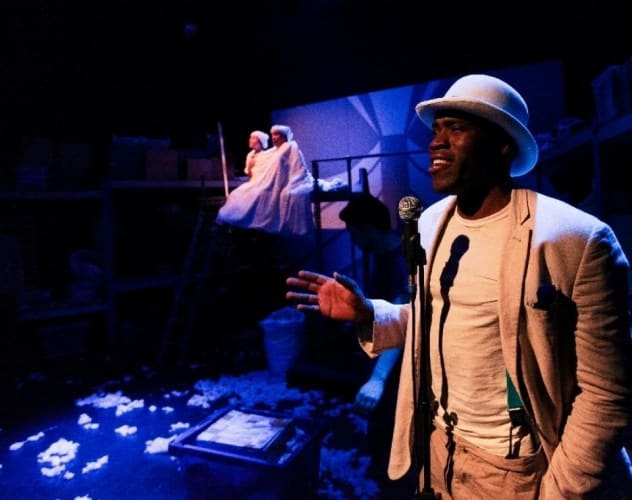StoneCrabs and Tanja Pagnuco have taken a big challenge with Philipp Löhle’s play.
Das Ding, an intricate play by a German upcoming star about cause and effect, about action and reaction in our globalised world, presents a string of interconnected stories and ‘das Ding’—the thing—a cotton boll, is the centre, is what should keep all these stories together.
A married couple in crisis, Katrin (Ivy Corbin) and Thomas (Dylan Kennedy), address directly the audience reimaging their first encounter, their troubles, their feelings etc as the wife’s curious and dangerous fantasies are gradually revealed.
A Swiss aid worker (Christopher Lane) is well intentioned in persuading African Siwa (Martins Imhangbe) to grow cotton ecologically. A young yet disillusioned photographer travels the world following his winning photo exhibition. Two young Chinese entrepreneurs make money out of shirt-making, soya-beams farming among other businesses around the globe.
The six actors double up, changing from role to role very quickly. The story of the ‘thing’ is, instead, narrated mainly by Martins Imhangbe, who seems to be the busiest on stage.
Leo Wan (Li) is convincing enough as one of the Chinese businessmen and in other side-characters, while Dylan Kennedy, who also plays Thomas to much better effect, gives a less credible impersonation of Li’s Chinese contrived business partner.
It is a play that, in its openness and randomness, can easily confuse and annoy. And at the start there is definitely a bit of both; presented with Ferdinand Magellan, the Portuguese explorer talking to his king, you have the impression, initially, that you might be in the wrong show.
Moving on to the next scene set in the present and by the end of the play, it is still unclear what the connection between Magellan and his broken leg is with all the rest.
However, we need to give the author and the production the benefit of the doubt, considering that what we are presented with here is no clear-cut naturalism. In the good German contemporary tradition, Löhle is a maverick of non-linear virtuosity and of bizarre connections.
All the characters are, in fact, somehow connected with one another, by either coincidence or relation. And the beauty of its uncanny plot is exactly that you are forced to explore the associations between characters and events, which, beyond the initial confusion and as the show progresses, become gradually more apparent.
Löhle’s experimenting with storytelling means that we are told the characters’ journey through flashbacks, cross-cuts to the present and references to the future. It is almost a cinematic experience. The only constant chronological element is the journey of the ‘thing’.
Theatrically, it is all about very short and speedy scenes that test the cast and the techies, who have to deal with several light and sound cues.
The rhythm of the production is fast and unpredictable and the audience cannot but be amused by the sudden humour and the inevitable persiflage of the revelations that unfold one by one, at great speed, towards the end.
The actors try their best to keep up, but the stage that looks crammed with a loft bed and metallic shelves, visibly filled with props, does not make it easy for them.
Pagnuco’s directing succeeds in making this an entertaining and imaginative experience, which is a bit Monty Python (the plastic fish, for instance, as a caricaturesque toy) and a bit Forced Entertainment, thanks to the strong physicality and visuality.
The essence of the play, though, the cotton boll, the thing, the centre of it all pays the price for this visual performance. Decentred, it gets really lost in between the different plots and subplots. Lacking the needed intensity and missing the poetic innuendoes of the text, especially in the monologues about the ‘thing’, possibly a neater and simpler staging would have had a bigger impression.
With a few other German plays produced in the last few years, German writers seem to have found their place in the London theatre scene. Yet, it might take a while for London to catch up, to find the right theatrical language for their non-naturalist scripts.
StoneCrabs and Pagnuco’s production is, for now, another step in this exploration.


